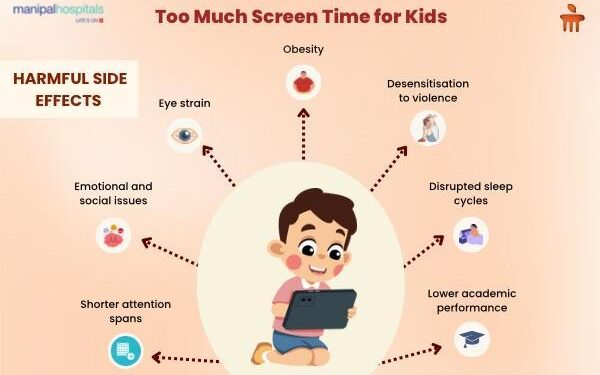Recent studies have raised concerns about the impact of excessive screen time on the heart health of young people. According to experts featured on www.heart.org, prolonged daily exposure to screens-whether from smartphones, tablets, or computers-may contribute to increased cardiovascular risks among youth. As digital devices become ever more integral to daily life, health professionals are urging families and educators to reconsider how screen habits could be affecting the next generation’s long-term well-being.
Excessive Screen Time Among Youth Linked to Increased Heart Health Risks
Recent studies have revealed a troubling correlation between prolonged screen exposure in young individuals and the rise of cardiovascular issues. Medical experts emphasize that sedentary behavior associated with excessive use of smartphones, tablets, and computers may contribute to early signs of heart disease, including elevated blood pressure and increased cholesterol levels. These risk factors, often overlooked in youth, can set the stage for more severe cardiac conditions later in life.
Key concerns identified include:
- Reduced physical activity leading to obesity
- Disrupted sleep patterns, impacting heart rate regulation
- Increased stress and anxiety levels affecting vascular health
| Screen Time Duration | Associated Risk | Recommended Limit |
|---|---|---|
| 4+ hours daily | High risk of hypertension | Less than 2 hours |
| 2-4 hours daily | Moderate risk of obesity | Less than 2 hours |
| Under 2 hours | Minimal risk | Optimal |
Healthcare professionals advocate for balanced digital consumption paired with regular physical activity to mitigate these risks. Implementing screen time guidelines within households and encouraging physical exercise can play a pivotal role in safeguarding the cardiovascular health of the younger generation.
How Sedentary Behavior and Poor Sleep Patterns Affect Young Hearts
Extended periods of inactivity, particularly linked to excessive screen time, are increasingly recognized as a significant threat to cardiovascular health in younger populations. When sedentary habits become routine, blood flow slows down, metabolism decreases, and the risk of developing early signs of heart disease rises. Studies have shown that even after accounting for regular exercise, long hours spent sitting can raise levels of harmful cholesterol and blood sugar, compounding risks associated with poor heart function.
Compounding this issue, disrupted or inadequate sleep among youth often coincides with sedentary lifestyles, creating a dangerous one-two punch. Sleep deficits can elevate stress hormones like cortisol, increase blood pressure, and promote inflammation, all of which strain the heart. Below is a quick comparison illustrating the cardiovascular impact of healthy versus poor bedtime routines:
| Sleep Pattern | Typical Effects on Heart | Associated Risks |
|---|---|---|
| Consistent 8+ hours | Restores heart function, stabilizes blood pressure | Lower risk of hypertension, reduced inflammation |
| Irregular or <6 hours | Elevated cortisol, disrupted metabolism | Increased risk of arrhythmias, early arterial damage |
- Limited physical activity diminishes cardiac efficiency.
- Poor sleep quality aggravates vascular inflammation.
- Combined effects can accelerate the onset of cardiovascular issues even in teens.
Expert Recommendations for Reducing Screen Time to Protect Cardiovascular Health
Health experts emphasize that mitigating prolonged screen exposure is vital for safeguarding cardiovascular function in young individuals. Strategies include:
- Incorporating regular screen breaks: Taking a 5-10 minute break every hour to stand, stretch, or walk helps maintain blood flow and prevents sedentary stiffness.
- Prioritizing physical activity: Engaging in at least 60 minutes of moderate-to-vigorous exercise daily counteracts the negative impacts associated with extended screen use.
- Limiting recreational screen time: Setting clear boundaries around entertainment-related screen use to under two hours per day supports heart health and overall wellbeing.
- Creating technology-free zones: Designating areas such as dining tables or bedrooms as screen-free encourages healthier habits and reduces mindless usage.
Research reveals a growing correlation between excessive sedentary behavior and early signs of cardiovascular strain among youth. To illustrate the recommended balance, the following table outlines sample daily routines endorsed by cardiologists for optimal screen and activity time:
| Activity | Recommended Duration | |||||||||
|---|---|---|---|---|---|---|---|---|---|---|
| Educational Screen Time | 1 to 2 hours | |||||||||
| Recreational Screen Time | Less than 2 hours | |||||||||
| Physical Activity | At least 60 minutes | |||||||||
Non-Screen Relaxation
If you want, I can help you further improve or style the content or provide additional recommendations related to cardiovascular health and screen time management. Wrapping UpAs concerns over youth heart health continue to rise, experts emphasize the importance of monitoring and limiting screen time among young populations. While digital devices remain integral to education and social interaction, balancing screen use with physical activity is crucial to safeguarding cardiovascular well-being. For more detailed information and guidance, visit www.heart.org. |










